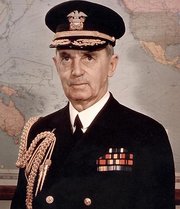William D. Leahy
|
|
For information about the Boston College president see William P. Leahy, SJ.
William Daniel Leahy (May 6, 1875 – July 20, 1959) was an American naval officer and the first such officer ever to hold the rank of Fleet Admiral and the first ever to hold five-star rank in the U.S. armed forces.
Leahy was born in Hampshire, Iowa and educated at the United States Naval Academy in Annapolis, from which he graduated in 1897. Leahy saw service in the Spanish-American War (1898), the Philippines (1899-91), China (1900), Nicaragua (1912), Haiti (1916) and Mexico (1916).
During the First World War Leahy was captain of the dispatch boat used by future U.S. President Franklin D. Roosevelt, then Assistant Secretary of the Navy. The two men became close friends for the rest of their lives.
By 1936 Leahy had reached the rank of admiral and the following year he became Chief of Naval Operations and held the post until he retired from the United States Navy in August 1939. After the surrender of France, Leahy was appointed American ambassador to Vichy France, the regime ruling over the south of France and the French overseas empire. Leahy's goal was to persuade the Vichy government to rejoin the war against Hitler, but he was entirely unsuccessful.
After the United States entered World War II, President Roosevelt decided he needed a senior military officer as personal adviser and point of contact with his three service chiefs, Admiral Ernest King of the Navy, General George Marshall of the Army and General Henry Arnold of the Army Air Forces. The service chiefs resisted this move until Marshall suggested that only Leahy would be accepted in this post. On July 6, 1942, Leahy was appointed chief of staff to the commander in chief of the United States.
He was effectively the first chairman of the Joint Chiefs of Staff, a position he held during most of World War II. However, his actual title was Chief of Staff to the President of the United States. The first person to formally be Chairman of the Joint Chiefs of Staff was Leahy's successor, General of the Army Omar Bradley. Prior to his service as Chief of Staff, Leahy had served as Governor of Puerto Rico and ambassador to Vichy France.
Leahy was appointed the first US Fleet Admiral on December 15, 1944. He was critical of the atomic bombings of Hiroshima and Nagasaki that in his eyes were "of no material assistance in our war against Japan". His feeling was that "in being the first to use it, we had adopted an ethical standard common to the barbarians of the Dark Ages. I was not taught to make war in that fashion, and wars cannot be won by destroying women and children."
Leahy resigned in March 1949 and the following year published his war memoirs, I Was There. Fleet Admiral Leahy died at Bethesda Naval Hospital on July 20, 1959.
Leahy's name resurfaced in early April 2004 when it was discussed in the media whether or not National Security Adviser Condoleezza Rice should testify in front of a congressional panel investigating the September 11, 2001 attacks. This resulted from a photo of Leahy testifying in 1945 to a congressional panel investigating the 1941 attack on Pearl Harbor, thus demonstrating a precedent for Rice's testimony.
| Preceded by: William H. Standley | United States Chief of Naval Operations 1937-1939 | Succeeded by: Harold R. Stark |
| Preceded by: José E. Colón | Governor of Puerto Rico 1939-1940 | Succeeded by: José Miguel Gallardo |
| Preceded by: William C. Bullitt | United States Ambassador to France 1940–1942 | Succeeded by: (none) |
| Preceded by: None | Chief of Staff to the Commander in Chief 1942–1949 | Succeeded by: Omar Bradley (Chairman of the Joint Chiefs of Staff) External link
|

